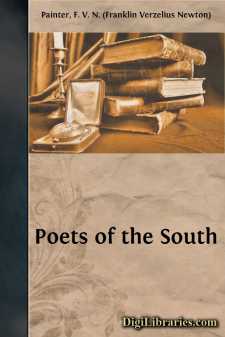Categories
- Antiques & Collectibles 13
- Architecture 36
- Art 48
- Bibles 22
- Biography & Autobiography 813
- Body, Mind & Spirit 142
- Business & Economics 28
- Children's Books 15
- Children's Fiction 12
- Computers 4
- Cooking 94
- Crafts & Hobbies 4
- Drama 346
- Education 46
- Family & Relationships 57
- Fiction 11828
- Games 19
- Gardening 17
- Health & Fitness 34
- History 1377
- House & Home 1
- Humor 147
- Juvenile Fiction 1873
- Juvenile Nonfiction 202
- Language Arts & Disciplines 88
- Law 16
- Literary Collections 686
- Literary Criticism 179
- Mathematics 13
- Medical 41
- Music 40
- Nature 179
- Non-Classifiable 1768
- Performing Arts 7
- Periodicals 1453
- Philosophy 64
- Photography 2
- Poetry 896
- Political Science 203
- Psychology 42
- Reference 154
- Religion 513
- Science 126
- Self-Help 84
- Social Science 81
- Sports & Recreation 34
- Study Aids 3
- Technology & Engineering 59
- Transportation 23
- Travel 463
- True Crime 29
Poets of the South
Description:
Excerpt
CHAPTER I
MINOR POETS OF THE SOUTH
The first poetic writer of this country had his home at Jamestown. He was GEORGE SANDYS who came to Virginia in 1621, and succeeded his brother as treasurer of the newly established colony. Amid the hardships of pioneer colonial life, in which he proved himself a leading spirit, he had the literary zeal to complete his translation of Ovid's Metamorphoses, which he had begun in England. After the toilsome day, spent in introducing iron works or in encouraging shipbuilding, he sat down at night, within the shadow of surrounding forests, to construct his careful, rhymed pentameters. The conditions under which he wrote were very far removed from the Golden Age which he described,—
"Which uncompelled
And without rule, in faith and truth, excelled."
The promise of this bright, heroic beginning in poetry was not realized; and scarcely another voice was heard in verse in the South before the Revolution. The type of civilization developed in the South prior to the Civil War, admirable as it was in many other particulars, was hardly favorable to literature. The energies of the most intelligent portion of the population were directed to agriculture or to politics; and many of the foremost statesmen of our country—men like Washington, Jefferson, Marshall, Calhoun, Benton—were from the Southern states. The system of slavery, while building up baronial homes of wealth, culture, and boundless hospitality, checked manufacture, retarded the growth of cities, and turned the tide of immigration westward. Without a vigorous public school system, a considerable part of the non-slaveholding class remained without literary taste or culture.
The South has been chiefly an agricultural region, and has adhered to conservative habits of thought. While various movements in theology, philosophy, and literature were stirring New England, the South pursued the even tenor of its way. Of all parts of our country, it has been most tenacious of old customs and beliefs. Before the Civil War the cultivated classes of the Southern states found their intellectual nourishment in the older English classics, and Pope, Addison, and Shakespeare formed a part of every gentleman's library. There were no great publishing houses to stimulate literary production; and to this day Southern writers are dependent chiefly on Northern publishers to give their works to the public. Literature was hardly taken seriously; it was rather regarded, to use the words of Paul Hamilton Hayne, "as the choice recreation of gentlemen, as something fair and good, to be courted in a dainty, amateur fashion, and illustrated by apropos quotations from Lucretius, Virgil, or Horace." Thus it happened that before the Civil War literature in the South, whether prose or poetry, had a less vigorous development than in the Middle States and New England.
Yet it has been common to undervalue the literary work of the South. While literature was not generally encouraged there before the Civil War,—a fact lamented by gifted, representative writers,—there were at least two literary centers that exerted a notable influence....



